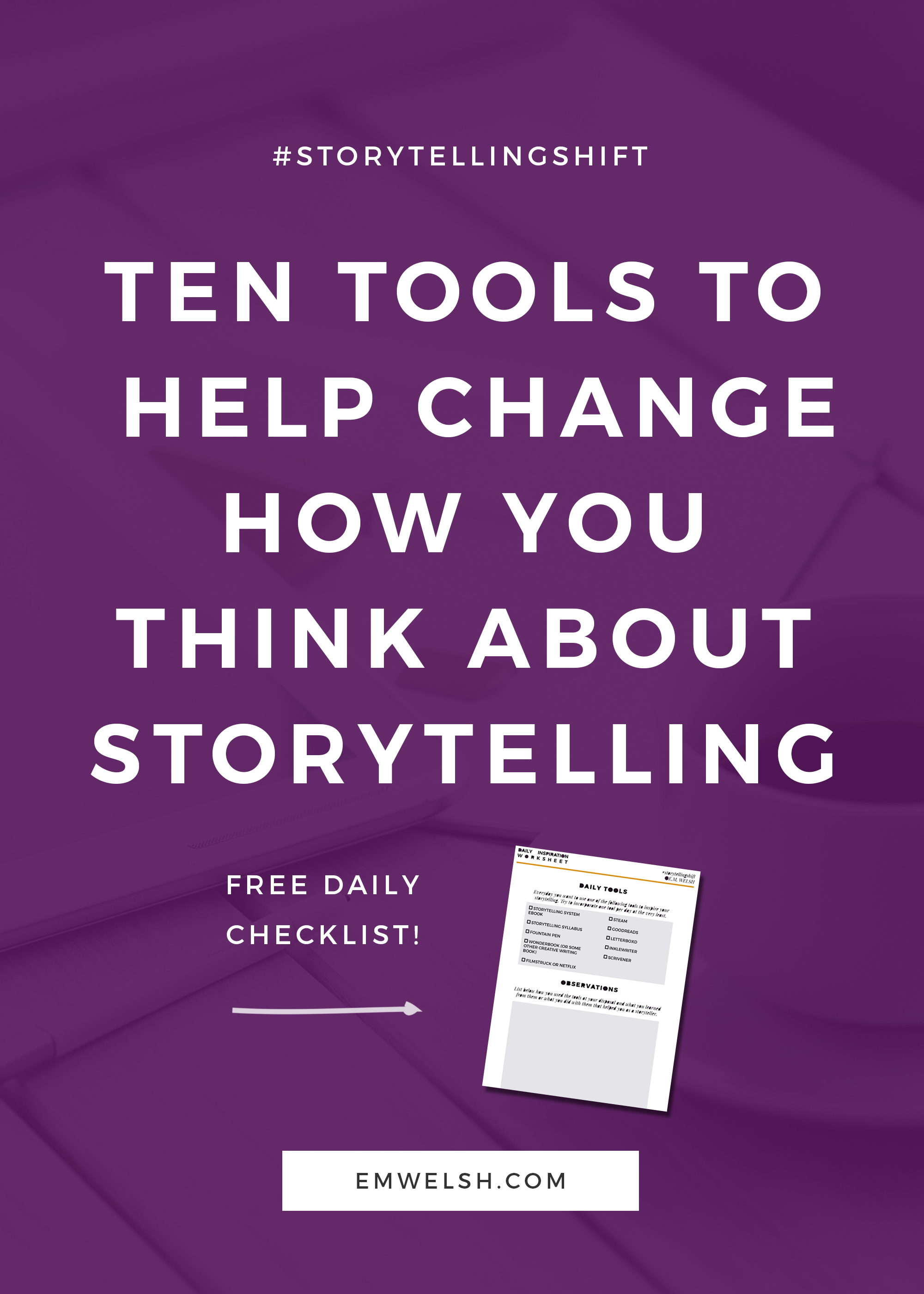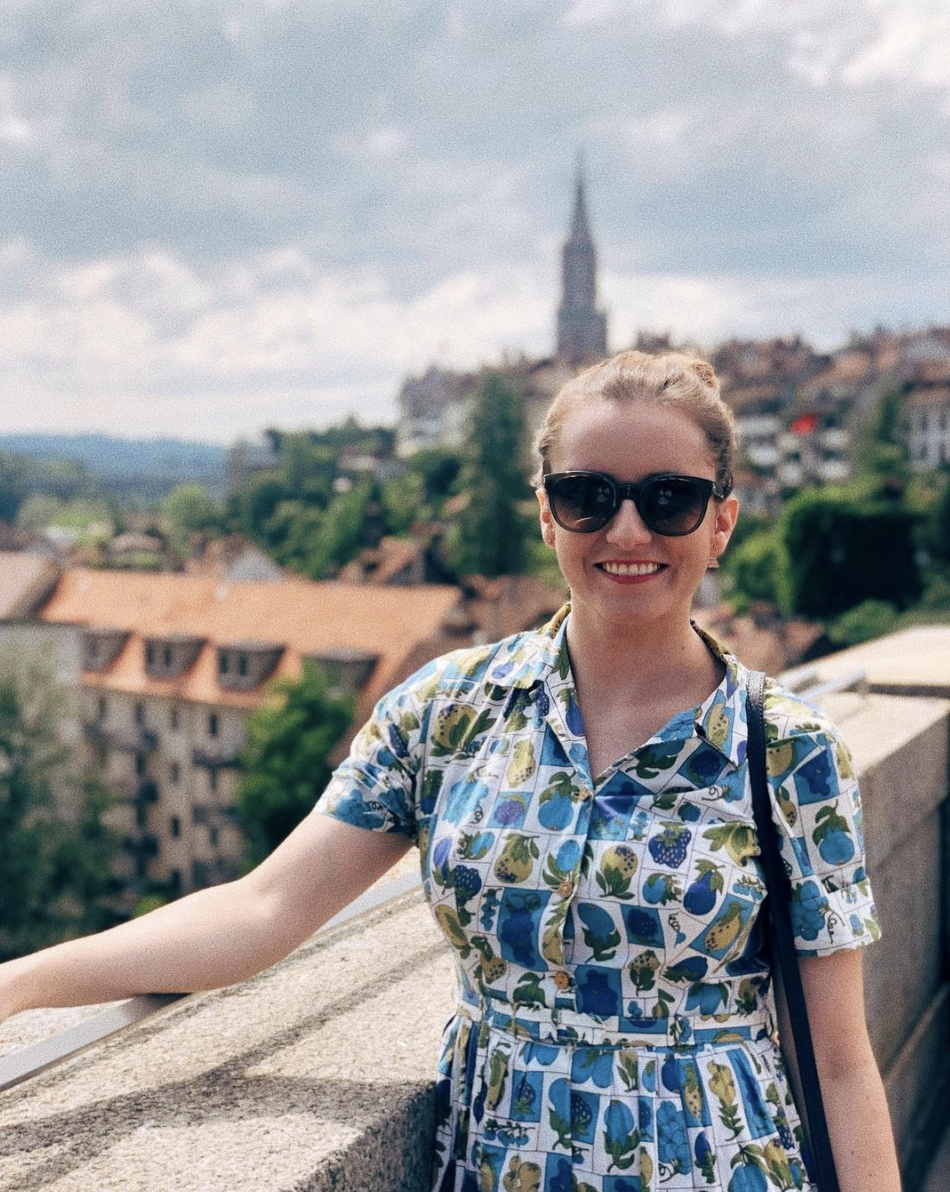How to be a Good Storyteller
/If you asked any fellow writer if they wanted to be a “good storyteller” they would undoubtedly say “yes.” Even if it’s not for reasons tied to fame, recognition, or success, everyone wants to be good at what they do.
However, to be “good” at something has many different meanings, especially in the artistic world.
You can be a good writer, meaning you write stories well and convey them in an artful and interesting way.
Or, you can be a good writer, meaning you are conscientious about storytelling an actively pursue more and more stories.
To put it more simply, the second definition has nothing to do with talent or skill, but your actual commitment to the craft. It asks whether or not you, as a storyteller are making regular efforts to improve your abilities.
Though this post is focusing on the second definition of a good storyteller, it is worth noting that any efforts on your part to be a better storyteller – in terms of building good storytelling habits – will also inherently develop your skills as a good writer – as in the type that writes stories well.
What is a Good Storyteller?
Before you learn anything about how to develop good storytelling practices, it’s important to understand that there is also a difference between a good storyteller and a good writer.
A good writer is focused more on the literal qualities of writing, whereas a good storyteller, by contrast, is someone who tries to see and appreciate the story in everything.
It’s not to say a good storyteller cannot focus and develop writing habits and skills, but more so that a good storyteller speaks to a much broader understanding of narratives.
In many ways, this means storytellers study things beyond literal writing, such as you’d find in a book, and look to other things like movies and video games, but also even more abstract things like musical arrangements, paintings, and nature itself.
As you can imagine, when you start to see the story in everything and have a more open mind towards what is a story, your writing and other skills associated with storytelling improve quickly because you are challenging yourself as a writer and storyteller.
Suddenly, nouns and adverbs turn into shot composition or a live audience, and just in seeing your storytelling world in a new light, you are able to find new solutions and approaches to writing much more quickly than if you had just remained focused on being a good writer.
How to Be a Good Storyteller
Now that you understand what makes one a good storyteller, both in terms of skill set and in terms of habit, let’s dive into the different ways you can improve your habits as a writer and storyteller.
Write Often
Writing is just a small portion of what it means to be a good storyteller, though it should not go forgotten. This might seem like an obvious part of becoming a good storyteller, but often we storytellers become so lost in the work of others we can forget to return to our own stories.
And the truth is, you cannot become a good storyteller unless you practice writing and telling stories often.
How “often” you should write is up to you, but it should almost always be more often than you are comfortable with.
For instance, if writing every day would feel like a challenge to you, then it is almost certainly something you should try. Or if writing once a month seems “doable,” try and amp it up to three times a month.
It doesn’t mean you can’t skip a day or two, but one of the key benefits in writing often – whatever that might mean for you – is that you are making a conscious effort to think about your own stories more than you might usually do so.
One of the biggest benefits I saw take shape in my writing life came from writing daily, something I was so sure “wasn’t for me.” But fairly quickly I realized that writers didn’t write daily because they had inspiration or because they always knew what was happening next – one of the many excuses I used to use to avoid writing more regularly – but because in writing daily, they were forcing themselves to think about their stories regularly. And this, in turn, led to them thinking in their spare time about their work and finding more solutions in their subconscious as a result.
So, first and foremost, before you look at the other habits to becoming a good storyteller in this article, ask yourself if you are writing often enough.
Read Lots of Books
No matter what types of stories you tell, you absolutely need to be reading books.
Prose has so much to teach storytellers about a series of small details building an enormous, big picture tale.
In a single sentence, novels and short stories can tell a tale on their own. Just look at these six-word stories if you don’t believe me.
In studying prose, you can learn so much about how to craft a beautiful sentence, how to pace out a story with words and sentences and paragraphs, and how to create abstract meanings with personification, paradoxes, and other literary devices.
But beyond a sentence, there’s the narrator of any piece of prose, the voice of the author communicating to you, the reader, directly, creating an experience unlike any other storytelling medium. Whether that voice is reliable or not is part of the enchanting nature of prose, and why so many people love books like The Bell Jar or Catcher in the Rye, whose narrator’s are so interesting that people read their stories for them, not the progression of the plot.
Finally, prose teaches storytellers how to break all conventional rules and structures. Novels can be 80 pages or 800 – there is no right or wrong amount. Chapters can be two sentences long or span the entire length of a book. With such a variety in pace and length, every novel is going to teach you a story in a different way, which is why you should always be reading regularly as a good storyteller
Even if you don't write prose, in reading it you'll grow a profound appreciation for the power of words on paper creating a story in your head, all through imagination, conveying things no other image, sound, or experience could.
Binge on Movies and Television Shows
Though you likely already watch movies and television shows regularly, I imagine you’ve often told yourself doing either of these things was a “waste of time” or that you’ve been binging “too much.”
However, when you write film and television off like this, labeling them as inferior to literature, you are completely missing an opportunity as a storyteller to study storytelling in a new form.
Film and television are more powerful than you might realize. While prose has the power of language, film and television have the power of engaging directly with our senses, providing us with images and sounds that make a story feel real.
In fact, did you know that once the television came out and shows were in color, people went from dreaming in black and white to dreaming in color? Pretty powerful stuff, huh?
But film and television are much more subtle and layered than people give them credit for. An image can have so many different features all happening at once that no novel could, because unlike with words on paper which we read one after the other, in images we see everything at once.
Additionally, films and television can quickly create a feeling for people with a series of images, which humans can decipher and understand so much more easily. They can create emotions in a single montage or make you feel uneasy by focusing on the same image for too long.
But on top of all this, television itself provides one of the most unique storytelling structures available to us, making it a wonderful device to study on its own, outside of film.
So, next time you watch a movie or “binge” on Netflix, take some time as a conscious storyteller to study what the narrative is doing with stories differently.
See Plays at Your Local Theater
Theatre is the oldest storytelling medium out there, so if you want to take some time to learn from the masters, you better make seeing a play a priority.
In doing so, you’ll see how powerful it is when people communicate a story in real life to a live audience. There is a connection there unlike any other medium offers, a direct interaction with the story and the people that make that story possible.
But even if you can’t see a play regularly, make a point to read them often. What you’ll notice – very quickly – is how much we can learn about a character just from how they speak.
An entire play can be driven by conversation, and usually is. Within that conversation, with dialogue alone, as a storyteller you must learn how to convey plot, character, backstory – everything – without explaining it.
And you must do it all using the imaginative theater, where things are simultaneously so real, yet also so clearly a performance.
The stage and the live audience together create an experience unlike any other for storytellers, where your neighbor's seat and perspective will vary completely from your own. Couple that with the short-lived nature of a play, that can only exist in your memory, never to be seen performed in the same way again, and you have one of the most fragile yet powerful forms of storytelling.
And though you cannot always see a play live, you’ll find over time that with reading plays just how much work the writer must do to pack so much meaning in words alone, giving the actors and directors flexibility to interpret the characters differently, yet also writing everything with enough authority that the meaning never changes.
It’s a skill that comes with a deep understanding of humans, something you can only develop to such an extent with a live, breathing version of your story. Next time you see a play, take the time to remember this and study how it affects the story itself.
Play Video Games – Don't Watch Them
Video games are the newest storytelling form out there, and as a result often are not taken seriously. But every type of writer has an immense amount they can learn from a video game.
Take for example all the endless possibility a video game offers. Even in games that aren’t about choices, there is a sense of freedom that we as the players are people writing this story ourselves when we play them.
You can decide to take a left turn or a right turn, and it is inherently, you the player, who has made that choice. Even if it is a meaningless choice, it is a choice that puts you in the front seat of the story, so you are more than just observing, you’re a part of the story.
Beyond this, video games offer one of the most immersive experiences of all storytelling mediums. In no other storytelling form can you make choices, explore the world at your leisure, or interact and converse with your favorite characters whenever you choose.
Yet the worldbuilding and immersion just scratches the surface as to what you can study in video games. Video games can simulate different perspectives and experiences, creating a more effective and permanent empathy for situations people do not understand than almost any other storytelling medium, literally placing players in other people’s shoes.
In fact, studies have shown that men who play video games as women characters are noticeably more empathetic towards the feminine experience afterward, just showing how powerful this possibility for immersion and empathy is.
In addition to all of this, video games can be highly artistic, incorporating all the elements of other storytelling mediums into one enormous narrative.
For that reason, the structure alone of video games is worth studying and learning from as a storyteller. The mechanics are some of the most interactive of any medium, challenging players and storytellers alike to rethink what a typical story looks like.
Because just like with books, video games can be 2 hours or 200 hours, meaning the structure between two games is never alike. But beyond just that, the approach to telling a story is so fresh and different from the other storytelling counterparts, playing a video game is sure to inspire your latest novel in no time.
Respect Different Mediums
With all this talk of different storytelling mediums, it’s important to note that in order to be a good storyteller, you should be very wary of – excuse the cliche – judging a book by its cover, or, more aptly, its genre.
You may be “certain” that you only like literary fiction or fantasy, or that video games “aren’t for you,” but I urge you to take time every once in awhile to engage with stories outside of your comfort zone.
So, with that in mind, even if you only write novels or video games, it’s important that you understand that no type of storytelling medium or genre is superior to another. One story may be better than another, but to write a story off based on the medium or genre is to potentially miss out on an entirely new approach to writing you may have never considered before.
If you don’t believe me, think back to that one story you had written off as lame or weird or “not for you” long ago, only to read it, watch it, or play it later and realize it was amazing and has since become one of the most influential pieces of storytelling material in your life.
See what I mean?
So, give every storytelling medium or genre a chance. Read a fantasy novel or a play a video game – even if you’re sure you’ll hate. Because more than likely you’ll uncover a new way to tell stories that you wouldn’t have found elsewhere.
Look for the Story in Everything
Beyond the various features we’ve talked about in developing your storytelling skills, there are many more. There’s the fact that you should try your best to return to old stories and work through the editing phases, but many times that is a more complex issue that may involve abandoning a story that is no longer right for you.
That is why as a writer, you should always look for the story in everything. In doing so, you’ll find solutions for editing your play or characters for your video game. They are out there, dispersed in the world and waiting for you to find them, and the best way to do so is to see the story in everything.
If you don’t believe me, take some time to people watch. You’ll find within a few minutes, without trying you have created an entire story just from two people together.
And if you can always find these stories everywhere, you’ll never be short of ideas or solutions.
BONUS: Write Stories Outside of Your Comfort Zone
Writing stories in different mediums isn’t for everyone, especially as a lifelong habit.
However, it’s no secret by now that in writing in new mediums and trying storytelling in different forms, you’ll develop your skills as a storyteller.
This is because in doing this, you’ll take everything you know about how you tell a story a certain way, and drop it. Then, you’ll be able to see your own storytelling skills challenged in a way unlike any other.
So, if you’re ready to put things in action, start writing stories outside of your comfort zone. This can be easily done with writing prompts, which makes writing stories in new mediums or styles a low risk venture, while still teaching you how to be a good storyteller.
No matter what, the main thing to take away from this article is that in order to be a good storyteller, you’ll want to surround yourself with stories of all different styles and approaches to storytelling.
It gets easy to become caught up in the same approach to being a “good storyteller,” but the best storytellers are the ones who are always challenging themselves to see stories in new ways. And if you incorporate all the things mentioned in this article, you’ll be sure to do just that.














